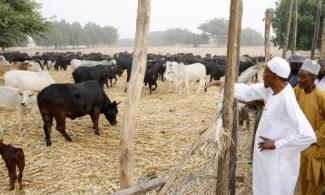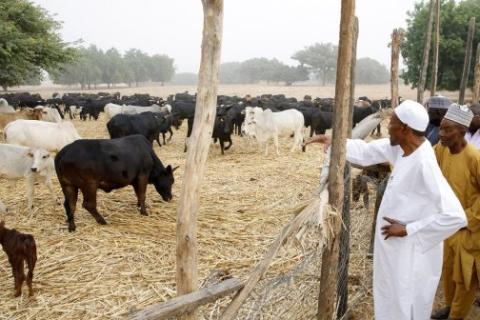
The 19 Northern States have grazing reserves. So far we have mapped out over 30 grazing reserves and on paper we have over 400 grazing reserves.
The Nigerian Government has planned 30 grazing reserves to implement the National Livestock Transformation Plan, as a lasting remedy to address the farmers/herders crisis in the country.
This was contained in a statement made during a press briefing by the Senior Special Assistant to the President on Agriculture, Dr. Andrew Kwasari on Wednesday in Abuja.

He said the project was aimed at putting to rest the enduring conflict between farmers and herders bordering on competition on land, water and pasture.
Kwasari said, "The National Livestock Transformation Plan is a sure way in solving permanently the issue of the farmer/herder conflict, the real farmers and herders that have conflict, and mark my words, real farmers and real herders that are in crisis today is triggered from resources of land, water and pasture.
"The 19 Northern States have grazing reserves. So far we have mapped out over 30 grazing reserves and on paper we have over 400 grazing reserves.
"So the northern governors have to be committed in working with the federal government, federal ministry of agriculture and rural development, supervision with the NEC, to make sure that wherever those grazing reserves are found, we are able to convert them into lush green models specifically for pastoralists and the pastoralists will not migrate anymore. The land is there, we don’t need to look for land anywhere.
“The traditional rulers we consulted, like the Gbom-Gbom Jos, clearly advised, and said the low hanging fruit for federal and state governments is to make sure we settle pastoralists in gazette grazing reserves.
“This takes away any notion of land grabbing or taking land from communities and giving to pastoralists because we are in volatile situation, hate speech and all of that.”
He further said that Nigerians need to be aware so as to embrace the NLTP by following modalities of the plan.
"If we are going to achieve this first of all Nigerians have to follow the signs that is clear to the NLTP, methodology of NLTP as clearly pointed in the NLTP.
"And every state that adopts NLTP, it is to its own reality; it is not conscription but if they do it this way it will modernise livestock production, modernise crop production, remove conflict, create dialogue, and create cohesion in communities."
He also explained that, “One of the targets we are working on here in the National Livestock Transformation Plan, and we know that working at the National Economic Council; the governors working with technical experts crafted this policy.
"The NLTP starts by training and arm-holding the pastoralists in the northern livestock production system, teaching them how to grow the pasture, settling them in a systematic way and environmentally friendly pattern. Our pastoralists are willing to learn.”
Kwasari also expressed optimism that with the collaboration between the Nigerian and state governments following the recent announcement of the Minister of Agriculture and Rural Development, Mohammad Nanono, would bring an end to the crisis.
"I hope with the move being made by both state and federal governments, particularly by the recent announcement made by the Minister of Agriculture, the NLTP will take off fully so that we can demonstrate that there is a new way to find a solution between the pastoralists and farmers in the NLTP," he said.
Speaking on other nation's current woes such as banditry, insurgency, kidnapping and other criminal activities, Kwasari said NLTP is not designed to address them.
He said, “On kidnapping and banditry, I don’t think NLTP is the answer because there is sheer criminality in that aspect, and I am sure that the security agencies are working on that.
"But the conflict between real herders and farmers over competition on land, water and pasture can be resolve the issue of land, water and pasture of true herders and that will help livestock production according to global best practices."